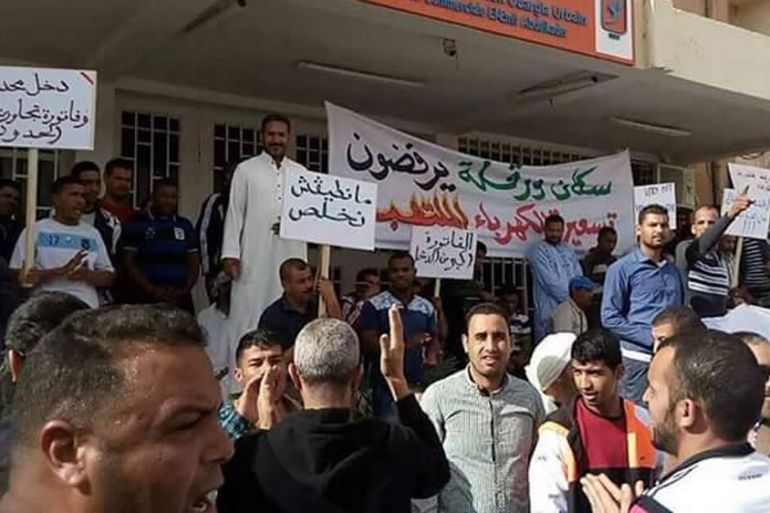Anger brewing in Algeria’s sullen south
Algeria’s Saharan region has massive reserves of oil and gas – but locals claim they are not reaping the benefits.

Algiers – Algerian politicians reversed course last month after voting to cut electricity subsidies – the first price rise in more than a decade.
In December, legislators slashed the price of electricity by 65 percent for those living in the Sahara Desert, while at the same time passing new cost-cutting measures to cope with plummeting energy prices and a rising budget deficit.
The decision came after mass protests across Algeria’s Sahara region last summer, in which thousands of people peacefully rallied against price increases and demanded that cuts in electricity subsidies be reversed.
“For us, it [the electricity bill] jumped from nearly 9,000 dinars [$80] to 24,000 dinars [$220]. Some of my neighbours had to pay almost 50,000 dinars [$450]. We can’t pay that much,” said Fellah Djelloul, a member of the National Coordination for the Protection of the Rights of Unemployed People, a grassroots movement that aims to defend the the rights of unemployed people.
“The hike in electricity prices led us to choose between feeding our children and turning on the air conditioner,” Hacina Zegzeg, who lives in the southern city of Ain Salah, told Al Jazeera.
READ MORE: Algeria economy – ‘The worst is to come’
Spontaneous demonstrations have become part of the daily routine in southern Algeria. The country’s Saharan region, traditionally regarded as a quiet, pro-government area, has recently emerged as the epicentre of public protest.
“The first episodes of unrest [in southern Algeria] date back to the 1970s-80s, but until the early 2010s, instability was occasional and very limited,” said Riccardo Fabiani, a senior North Africa analyst at the Eurasia Group. “What has changed, in the meantime, is that education levels in the south have increased, along with urbanisation and internet penetration. These factors have transformed the local population from passive residents into proactive and vocal citizens.”
The south might become the breaking point of Algeria's stability, as its topography makes it really hard to control and protect.
Dalia Ghanem-Yazbeck, an Algerian research analyst at the Carnegie Middle East Centre in Beirut, told Al Jazeera: “It is clear that the Saharan population is more inclined to ask for what they consider their rights and the duty of their government to provide them with.”
The electricity price rise is not the only grievance in southern Algeria. People have also been protesting against poverty, unemployment, housing shortages and the declining quality of public services, especially in critical areas such as education and healthcare.
Officially, the unemployment rate nationwide is estimated at 10 percent. But many living in the Sahara say that the true rate is close to 50 percent in their region. Only those lucky enough to have connections can hope for a decent job, said Ibrahim, a security guard in the city of Bechar, who did not provide his last name.
“Regarding the multinational companies that invest in Algeria’s desert region, they would all rather employ foreign workers,” alleged the 23-year-old, who earns 20,000 dinars ($180) a month.
The region’s years of steady oil and gas production – it is home to one of the biggest energy reserves in Africa – have not brought it prosperity, residents complain.

“Our soil is rich, but we remain poor,” Djelloul said.
Many in the Saharan region also complain of exclusion, perceiving the government to be distant and dominated by a northern elite that does not understand their needs.
“A dozen stadiums have recently been built in Ain Salah, a city of about 40,000 inhabitants, while there is only one library and the hospital is infested with rats and cockroaches. This is just to cite one example,” said Zegzeg, a leader of the anti-fracking movement that erupted in the remote city two years ago. “The central government in Algiers did not expect that the local population would disrupt the country’s multibillion-dollar shale gas project, as it despises us. When talking about the Saharan population, Algeria’s rulers always adopt a condescending tone. It is very humiliating.”
Al Jazeera sought a comment from labour ministry officials, but they declined.
According to Ghanem-Yazbeck, at the beginning of President Abdelaziz Bouteflika’s first term, “the Algerian government understood the electoral importance of the Sahara region. President Bouteflika had the highest percentage of the vote in that region. Today, it seems that the Algerian government remains deaf to the requests of the people.”
READ MORE: Algeria’s opposition flares up amid fracking plans
This sense of exclusion has led some to embrace radical forms of protest. Over the past five years, dozens of southern Algerians have set themselves on fire in front of public offices, echoing the self-immolation of Mohamed Bouazizi that triggered the 2010-11 uprising in neighbouring Tunisia.
More recently, a group of unemployed people demonstrating in Ouargla stitched their mouths shut and sliced their arms and chests with razors.
The Algerian government has traditionally staved off discontent through high levels of public spending, but the plunge in global oil prices has made this strategy more difficult to execute. If crude prices stay low, the Bouteflika government will no longer have the resources to maintain its carrot-and-stick policy, experts say.
“The regime has been focusing on buying social peace through top-down, ad hoc spending measures, discouraging protests and co-opting protest leaders. But its welfare system is shrinking and is no longer viable,” Ghanem-Yazbeck said.
The political and economic marginalisation of Algeria’s Sahara could pose a danger to the country’s stability, Ghanem-Yazbeck added.
“The south might become the breaking point of Algeria’s stability, as its topography makes it really hard to control and protect. And that makes it fertile ground for criminal and terrorist activities.”